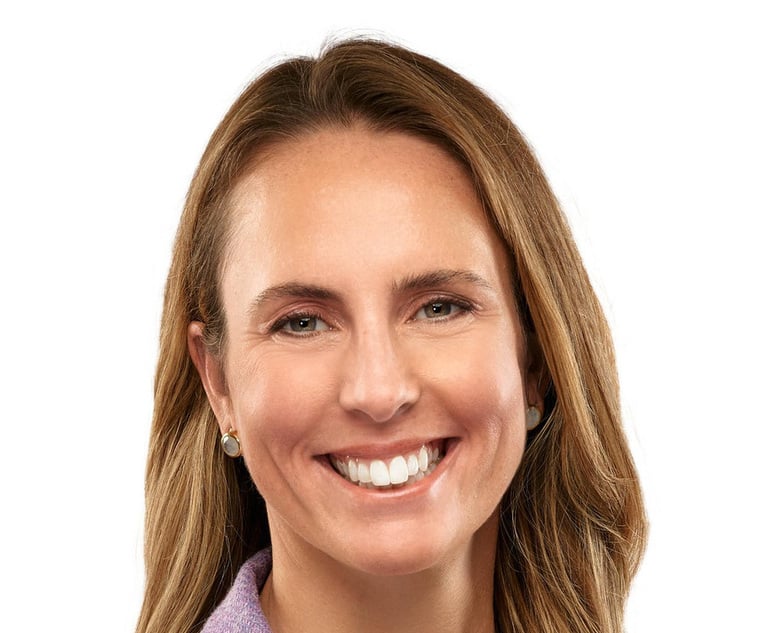Innovation, building the US and client focus: Allen & Overy's new leaders set out the firm's priorities
Allen & Overy managing partner Andrew Ballheimer and senior partner Wim Dejonghe discuss the magic circle firm's focus under their watch
June 01, 2016 at 06:21 AM
4 minute read
 "The legal market is changing and moving ever faster. In five years' time, you become a platform for legal excellence providing services on demand, not a law firm," says Allen & Overy (A&O) senior partner Wim Dejonghe, as he sets out his plans alongside managing partner Andrew Ballheimer.
"The legal market is changing and moving ever faster. In five years' time, you become a platform for legal excellence providing services on demand, not a law firm," says Allen & Overy (A&O) senior partner Wim Dejonghe, as he sets out his plans alongside managing partner Andrew Ballheimer.
Innovation was one of the strategic priorities discussed with partners by the pair at last month's partner conference in Dubai, with A&O determined to build on the success it has already seen with its flexible lawyer offering Peerpoint and its Belfast nearshoring centre.
Innovation sits alongside bolstering the firm's US practice both inside and outside America, diversity and top-line revenue growth in a plan that is fundamentally "all about the clients", according to Ballheimer.
When it comes to innovation, the A&O pair know there is no room for complacency. As Dejonghe points out, technology is transforming every aspect of our lives – including things as straightforward as light switches – so it is inevitable that it is now transforming the legal sector.
If you look at the business model of law firms over the last 50 years, has it altered? Yes
The pair want A&O to stay ahead of the curve both with technological changes and business transformation, which will include meeting the changing aspirations and motivations of millenials who want more flexible career paths.
The firm has an innovation committee and management is encouraging a culture of innovation.
Ballheimer says: "If you look at the business model of law firms over the last 50 years, has it altered? Yes, along with every other industry it's altered profoundly. The changes mean that the opportunities increase."
As part of this, Peerpoint is likely to expand to the US at some point.
"Clients are universally positive about Peerpoint," Ballheimer says. "We've expanded into Asia and over time it will expand into the States as well. The demand is there as it works for us and our clients."
As both made clear before they were elected, growth of the firm's US practice will form a central plank of targeted investment, with Europe seen as "90% built", allowing for some expansion in Germany, France and Spain.
Everyone makes a lot of noise about US capabilities but we have to be flexible
"We're a niche player in the States," admits Ballheimer. "In the US area, we have to have the best client offering for the core parts of our product mix. Have we got to do it in a way that others have done it? No. But we've got to have core area expertise, absolutely."
He adds: "I would say we will look at any opportunity that makes economic sense in terms of cultural fit and client needs. It's about having the best client proposition out there. We will look at the right opportunities that will enhance our offering in a culturally appropriate way."
Dejonghe stresses the market forces at play, such as Donald Trump's possible election as President of the US, which mean their plans need to be flexible.
He says: "Everyone makes a lot of noise about US capabilities but we have to be flexible to political changes and other factors."
US work currently accounts for £250m of the firm's global revenue and while the plan is for this to grow, the firm is not setting a target.
Much of the focus for management, whether looking at the US or elsewhere, will be joining up what is already there and ensuring that partners are cross-selling and using existing offerings such as Belfast and Peerpoint consistently.
As Ballheimer concludes: "In terms of our network, it's much broader than anyone else's. It offers an immense opportunity in our top-line growth – it's all about us working as a team and hunting in packs."
This content has been archived. It is available through our partners, LexisNexis® and Bloomberg Law.
To view this content, please continue to their sites.
Not a Lexis Subscriber?
Subscribe Now
Not a Bloomberg Law Subscriber?
Subscribe Now
NOT FOR REPRINT
© 2024 ALM Global, LLC, All Rights Reserved. Request academic re-use from www.copyright.com. All other uses, submit a request to [email protected]. For more information visit Asset & Logo Licensing.
You Might Like
View All
Pogust Goodhead Set to Axe Roles as Accounts Remain Overdue

DLA Piper Takes Greenberg Traurig’s Corporate Partner for Seoul

Cuatrecasas Elevates Seven to Partner in Spain and Latin America

McCarthy Tétrault Welcomes Former CPP Investments Leader to Its Business Law Group
2 minute readTrending Stories
- 1Friday Newspaper
- 2Judge Denies Sean Combs Third Bail Bid, Citing Community Safety
- 3Republican FTC Commissioner: 'The Time for Rulemaking by the Biden-Harris FTC Is Over'
- 4NY Appellate Panel Cites Student's Disciplinary History While Sending Negligence Claim Against School District to Trial
- 5A Meta DIG and Its Nvidia Implications
Who Got The Work
Michael G. Bongiorno, Andrew Scott Dulberg and Elizabeth E. Driscoll from Wilmer Cutler Pickering Hale and Dorr have stepped in to represent Symbotic Inc., an A.I.-enabled technology platform that focuses on increasing supply chain efficiency, and other defendants in a pending shareholder derivative lawsuit. The case, filed Oct. 2 in Massachusetts District Court by the Brown Law Firm on behalf of Stephen Austen, accuses certain officers and directors of misleading investors in regard to Symbotic's potential for margin growth by failing to disclose that the company was not equipped to timely deploy its systems or manage expenses through project delays. The case, assigned to U.S. District Judge Nathaniel M. Gorton, is 1:24-cv-12522, Austen v. Cohen et al.
Who Got The Work
Edmund Polubinski and Marie Killmond of Davis Polk & Wardwell have entered appearances for data platform software development company MongoDB and other defendants in a pending shareholder derivative lawsuit. The action, filed Oct. 7 in New York Southern District Court by the Brown Law Firm, accuses the company's directors and/or officers of falsely expressing confidence in the company’s restructuring of its sales incentive plan and downplaying the severity of decreases in its upfront commitments. The case is 1:24-cv-07594, Roy v. Ittycheria et al.
Who Got The Work
Amy O. Bruchs and Kurt F. Ellison of Michael Best & Friedrich have entered appearances for Epic Systems Corp. in a pending employment discrimination lawsuit. The suit was filed Sept. 7 in Wisconsin Western District Court by Levine Eisberner LLC and Siri & Glimstad on behalf of a project manager who claims that he was wrongfully terminated after applying for a religious exemption to the defendant's COVID-19 vaccine mandate. The case, assigned to U.S. Magistrate Judge Anita Marie Boor, is 3:24-cv-00630, Secker, Nathan v. Epic Systems Corporation.
Who Got The Work
David X. Sullivan, Thomas J. Finn and Gregory A. Hall from McCarter & English have entered appearances for Sunrun Installation Services in a pending civil rights lawsuit. The complaint was filed Sept. 4 in Connecticut District Court by attorney Robert M. Berke on behalf of former employee George Edward Steins, who was arrested and charged with employing an unregistered home improvement salesperson. The complaint alleges that had Sunrun informed the Connecticut Department of Consumer Protection that the plaintiff's employment had ended in 2017 and that he no longer held Sunrun's home improvement contractor license, he would not have been hit with charges, which were dismissed in May 2024. The case, assigned to U.S. District Judge Jeffrey A. Meyer, is 3:24-cv-01423, Steins v. Sunrun, Inc. et al.
Who Got The Work
Greenberg Traurig shareholder Joshua L. Raskin has entered an appearance for boohoo.com UK Ltd. in a pending patent infringement lawsuit. The suit, filed Sept. 3 in Texas Eastern District Court by Rozier Hardt McDonough on behalf of Alto Dynamics, asserts five patents related to an online shopping platform. The case, assigned to U.S. District Judge Rodney Gilstrap, is 2:24-cv-00719, Alto Dynamics, LLC v. boohoo.com UK Limited.
Featured Firms
Law Offices of Gary Martin Hays & Associates, P.C.
(470) 294-1674
Law Offices of Mark E. Salomone
(857) 444-6468
Smith & Hassler
(713) 739-1250









